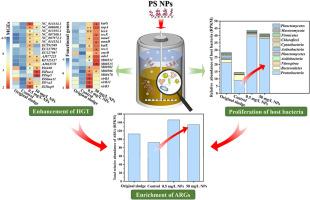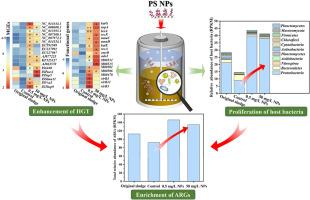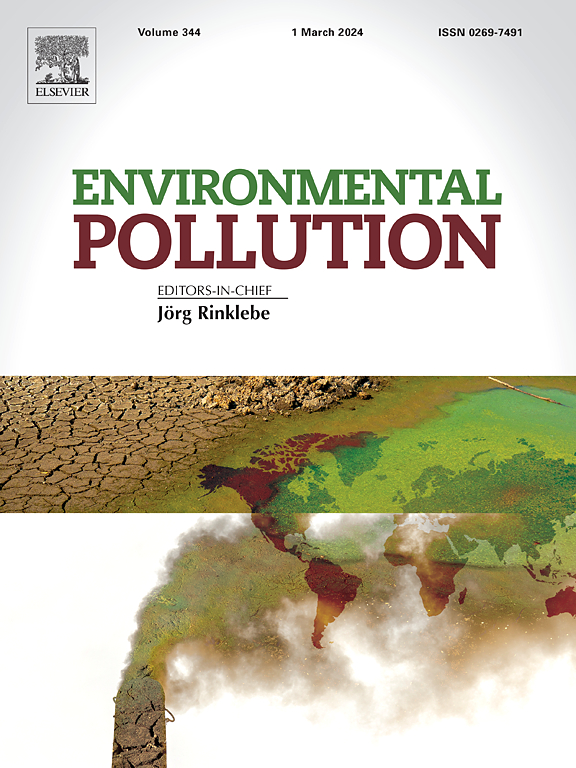暴露于纳米塑料时活性污泥中抗生素耐药基因富集的元基因组学启示
IF 7.6
2区 环境科学与生态学
Q1 ENVIRONMENTAL SCIENCES
引用次数: 0
摘要
活性污泥是纳米塑料(NPs)和抗生素抗性基因(ARGs)等新出现的污染物的重要储存库。然而,NPs 对活性污泥中 ARGs 转归的影响和潜在机制还不完全清楚。在此,我们采用元基因组学方法研究了活性污泥中环境相关浓度(0.5 mg/L)和高压力浓度(50 mg/L)下 ARGs、宿主细菌、移动遗传因子(MGEs)和功能基因对聚苯乙烯(PS)NPs 的反应。结果表明,0.5 毫克/升和 50 毫克/升 PS NPs 使活性污泥中 ARGs 的相对丰度分别增加了 58.68% 和 46.52%(p < 0.05)。宿主跟踪分析表明,PS NPs 显著丰富了 ARGs 的宿主(p < 0.05),其中变形菌是主要的宿主菌。此外,ARGs新宿主的出现以及MGEs和功能基因(即与SOS反应、细胞膜通透性和分泌系统等相关的基因)的富集表明,PS NPs促进了ARGs的水平基因转移(HGT)。最后,路径模型分析表明,PS NPs引起的ARGs增殖主要归因于HGT的增强和宿主细菌的富集。我们的研究结果有助于全面了解 NPs 污染下 ARGs 在活性污泥中的扩散风险。本文章由计算机程序翻译,如有差异,请以英文原文为准。


Metagenomic insight into the enrichment of antibiotic resistance genes in activated sludge upon exposure to nanoplastics
Activated sludge is an important reservoir for the co-occurring emerging contaminants including nanoplastics (NPs) and antibiotic resistance genes (ARGs). However, the impacts and potential mechanisms of NPs on the fate of ARGs in activated sludge are not fully understood. Herein, we used metagenomic approach to investigate the responses of ARGs, host bacteria, mobile genetic elements (MGEs), and functional genes to polystyrene (PS) NPs at environmentally relevant (0.5 mg/L) and high stress concentrations (50 mg/L) in activated sludge. The results showed that 0.5 and 50 mg/L PS NPs increased the relative abundance of ARGs in the activated sludge by 58.68% and 46.52%, respectively (p < 0.05). Host tracking analysis elucidated that the hosts of ARGs were significantly enriched by PS NPs (p < 0.05), with Proteobacteria being the predominant host bacteria. Additionally, the occurrence of new ARGs hosts and the enrichment of MGEs and functional genes (i.e., genes related to SOS response, cell membrane permeability, and secretion system, etc.) indicated that PS NPs promoted horizontal gene transfer (HGT) of ARGs. Finally, path modeling analysis revealed that the proliferation of ARGs caused by PS NPs was primarily attributed to the enhancement of HGT and the enrichment of host bacteria. Our findings contribute to a comprehensive understanding of the spread risk of ARGs in activated sludge under NPs pollution.
求助全文
通过发布文献求助,成功后即可免费获取论文全文。
去求助
来源期刊

Environmental Pollution
环境科学-环境科学
CiteScore
16.00
自引率
6.70%
发文量
2082
审稿时长
2.9 months
期刊介绍:
Environmental Pollution is an international peer-reviewed journal that publishes high-quality research papers and review articles covering all aspects of environmental pollution and its impacts on ecosystems and human health.
Subject areas include, but are not limited to:
• Sources and occurrences of pollutants that are clearly defined and measured in environmental compartments, food and food-related items, and human bodies;
• Interlinks between contaminant exposure and biological, ecological, and human health effects, including those of climate change;
• Contaminants of emerging concerns (including but not limited to antibiotic resistant microorganisms or genes, microplastics/nanoplastics, electronic wastes, light, and noise) and/or their biological, ecological, or human health effects;
• Laboratory and field studies on the remediation/mitigation of environmental pollution via new techniques and with clear links to biological, ecological, or human health effects;
• Modeling of pollution processes, patterns, or trends that is of clear environmental and/or human health interest;
• New techniques that measure and examine environmental occurrences, transport, behavior, and effects of pollutants within the environment or the laboratory, provided that they can be clearly used to address problems within regional or global environmental compartments.
 求助内容:
求助内容: 应助结果提醒方式:
应助结果提醒方式:


